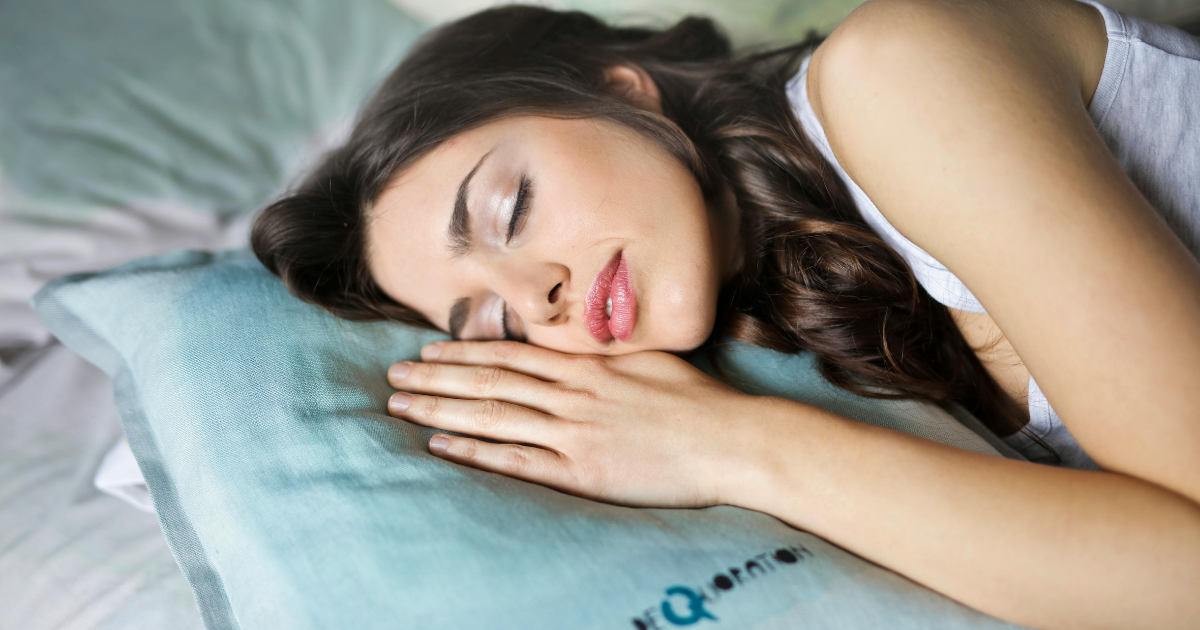Understanding the relationship between sleep and anxiety is important in today’s world. Many of us have been forced to tie both sleeping disorders and anxiety together in various ways, and each impacts the other. Anxiety issues continue to be the source of many health issues for many of us, as many suffer from nighttime anxieties during their sleep, or they tend to worry about how they will sleep at night.
This guide is a comprehensive exploration of the effects sleep can have on anxiety, the science behind sleep deprivation, its mental health implications, and provides practical tips for managing anxiety and sleep.
How Sleep Affects Anxiety Levels
It is perhaps one of the most essential aspects of our lives, and sleep keeps us emotionally balanced and sane. A lack of proper sleep may not only worsen feelings of anxiety but also make it even more challenging to deal with stress and emotion.
Restorative sleep lets your body rejuvenate itself, including regulating hormone levels, brain activities, and immune responses. A full night of restorative sleep also helps the brain process emotions, reduce stress hormones, and keep moods in check better. Without enough sleep, though, this whole process gets disrupted and increases anxiety.
Research findings indicate that workers under sleep deprivation tend to be more anxious under stress, or irritable in their workplaces. Moreover, your ability to think clearly and concentrate as well as solve problems is also impaired due to poor quality of sleep, so through these factors, anxiety could be changed.
Sleep’s Role in Regulating Stress Hormones
Sleep impacts the amount of stress hormones in the body. Cortisol is one of those hormones that results from stress and helps the body. You tend to produce more levels of cortisol when you sleep less, which increases the feeling or experience of anxiousness and stress.
Emotional Processing and Sleep
Your brain needs to sleep to work through emotions and experiences effectively. During stages of deep sleep, your brain consolidates memories and regulates moods. A bad quality of sleep might result in emotional bouts of lack of functioning, so increasing the perception of anxiety.
Why Anxiety Disrupts Sleep Patterns
Anxiety affects the mood not only during the day but also significantly during the night in terms of sleep. Many patients suffering from anxiety disorders experience insomnia or poor-quality sleep. This creates a vicious cycle whereby anxiety causes poor sleep, which, in turn, worsens anxiety.
Overactive Mind and Racing Thoughts
You end up with racing thoughts and cannot even wind down when anxious. You might see visions of how things will go out at work, family, health, and so many other things that all tend to trouble your mind and prevent you from sleeping.
Physical Symptoms of Anxiety Affecting Sleep
It is not only psychological but also physiological. It is commonly depicted as palpitations in the heart, muscular tensing, and acceleration of the respiratory tempo, making it greatly difficult to sleep or even remain asleep. These body sensations, combined with anxiety, make it quite challenging to wind down and sleep.
The Link Between Anxiety and Sleep Disorders
However, anxiety disorders are not mutually exclusive with sleep disorders. Most of the sufferers of anxiety fall into insomnia, characterized by sleep apnea sufferers and restless legs’ syndrome patients. So, the anxiety and sleep problems cycle becomes a bit too complicated to break.
Understanding the Sleep-Anxiety Cycle
There is always a cycle of sleep anxiety in which one problem feeds into another. Poor sleep promotes anxiety, and anxiety promotes sleep disturbances. Such a cycle can negatively affect health and well-being.
How Anxiety Leads to Sleep Disruptions
As your level of anxiety rises, your body is readied for the “fight or flight” by going into a heightened state of arousal that further precludes your ability to relax enough to enter into a meaningful sleeping state. Your body may be alert, preventing it from experiencing deep sleep, which is requisite for recovery.
How Sleep Deprivation Increases Anxiety
Chronic sleep loss also influences the brain’s mechanism of controlling emotions, and stress builds up. Lack of sleep also impacts cognitive functions, so one becomes hard-pressed to think and drive the point emotionally.
Breaking the Cycle of Anxiety and Poor Sleep
Breaking the cycle of sleep and anxiety requires an approach to be multipronged. That means understanding the roots of both sleep issues and anxiety and finding practical strategies to manage both.
The Science Behind Sleep Deprivation and Anxiety
Many research studies prove a direct link between sleep deprivation and anxiety. If the brain hasn’t rested fully, it cannot control stress and anxiety.
Impact on the Brain’s Stress Centers
This is when the human amygdala, the part of the brain capable of taking away your emotional control, becomes hyperactive. In contrast, your prefrontal cortex is relatively less active in controlling your emotions and settling your decision-making habits. As a result, you’re weaker in managing stress and more prone to anxiety.
The Role of Neurotransmitters in Sleep and Anxiety
Serotonin and dopamine are other neurotransmitters implicated in sleep quality and mental health. Concerning this factor, serotonin imbalance has been thought to arise when one is sleep-deprived, which means that anxiety gets worse. This dysregulation is said to impact mood, sleep, and general wellness.
Recognizing Sleep Issues Related to Anxiety
It’s very important to realize when your sleep problems may coincide with anxiety. When your sleep is constantly disrupted by worries, racing thoughts, or physical symptoms of anxiety, it may be time to start coping with both issues at once.
Common Sleep Disorders Linked to Anxiety
In most cases, conditions such as insomnia, night sweats, and sleep paralysis are amplified by anxiety. Individuals who have these disorders will also experience repetitive nighttime awakenings, which negatively affect the quality of sleep.
Identifying Signs of Sleep Disturbances From Anxiety
It is usually at this point that one may know they are troubled with sleep disturbances from anxiety, thereby acting early. One of the signs is excessive tossing and turning, having difficulty falling asleep, or waking up without feeling refreshed.
Tips for Improving Sleep Quality With Anxiety
Here are some helpful tips on how to improve the quality of sleep while managing anxiety.
Relaxation Techniques Before Bed
Use the following pre-sleep relaxation techniques, such as mindfulness meditation, deep breathing, or progressive muscle relaxation, to relax your mind and prepare your body for sleep. These techniques reduce body tension and prepare the body to relax.

Establishing a Sleep Schedule
This natural internal mechanism of the body can be better regulated if a person goes to bed at the same hour of the day. With a routine, it becomes easier to fall asleep and wake up fresh. It also reduces the chance of sleep anxiety, which might, therefore, improve the quality of sleep.
Creating a Calming Sleep Environment
Keep it cool, dark, quiet. It can be an oasis for sleep. Reduce screen use before bed because blue light from cell phones and computers disrupts melatonin.
Cognitive Behavioral Therapy for Insomnia (CBT-I)
The CBT-I is a structured therapy to be performed with anxiety and sleep patients so that they may train their brains for healthier sleep habits. This therapy has proved to be highly effective in controlling insomnia, along with curing anxiety.
When to Seek Help for Anxiety and Sleep Issues
Anxiety and sleep problems should be reported to a healthcare provider if they continue despite having tried self-help measures. Professionals will help diagnose any underlying conditions and recommend therapy, medication, or lifestyle changes.
Therapy and Counseling
Some therapy programs, such as Cognitive Behavioral Therapy and Cognitive Behavioral Therapy for Insomnia, may cure both anxiety and sleep simultaneously. They are typically applied to patients who have longstanding anxiety together with insomnia.
Medical Interventions
In some cases, pharmacotherapy is used to add to the treatment of anxiety disorder and enhance sleep. Medication for this purpose includes those that alleviate anxiety, such as SSRIs, or improve the quality of sleep with sedative-hypnotics.
Finding Balance Between Sleep and Anxiety
The most important factor in dealing with these two conflicting areas is balance in sleep and anxiety. Therefore, it is essential to create a healthy sleep habit complemented by effective anxiety management to ensure long-term improvement in both areas of life.
Lifestyle Changes for Better Sleep and Anxiety Management
Being healthy and fit through exercise, nutrition, and stress management practices will significantly affect sleep and anxiety. Mood regulation, reduced stress, and quality sleep have been proven to be crucial effects of such practices.
Closing Thoughts
Understanding the link between sleep and anxiety is a doorway to effective management of both problems. By using proper techniques for the sleep environment, relaxation techniques, and access to professional support where needed, you can break the cycle of anxiety and poor sleep. If you have problems with anxiety and sleep, you are not alone: help for you exists.
If the situation aggravates over time concerning managing your anxiety and sleep problems, there is no need to hold back. We would be glad to provide you with personalized strategies to regain control over your mental health and improve sleep quality.
FAQs

- How does poor sleep affect anxiety?
Poor sleep can increase anxiety by disrupting the brain’s ability to regulate emotions and stress. Sleep deprivation leads to higher levels of stress hormones, worsening feelings of anxiety.
- Can anxiety cause sleep problems?
Yes, anxiety can lead to sleep problems like insomnia and restlessness. Racing thoughts, physical tension, and heightened stress levels can make falling or staying asleep difficult.
- What is the connection between anxiety and sleep deprivation?
Anxiety and sleep deprivation form a cycle where lack of sleep heightens anxiety, and anxiety makes it harder to sleep. This cycle can worsen mental health if not addressed.
- How can I improve my sleep if I have anxiety?
Try relaxation techniques like meditation or deep breathing to improve sleep, maintain a consistent sleep schedule, and create a calming environment in your bedroom.
- When should I seek help for sleep and anxiety issues?
If anxiety and sleep problems persist despite self-care efforts, it may be time to seek professional help, such as therapy or medication, to address the underlying causes.








